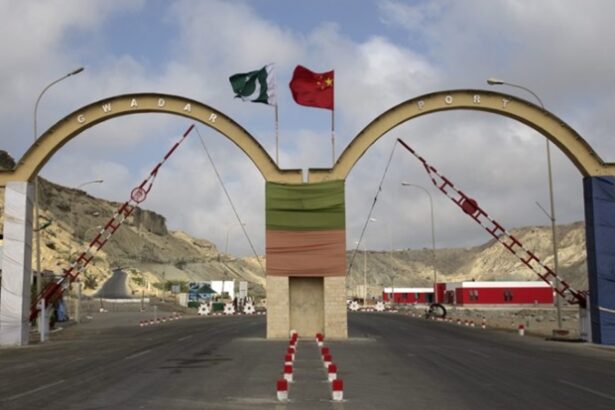Pakistan’s security establishment has once again failed to protect Chinese nationals from extremist attacks. On October 6, two Chinese nationals were killed and one injured in a vehicle-borne improvised explosive device (VBIED) attack near Karachi’s international airport. The Balochistan Liberation Army (BLA), which has previously targeted Chinese nationals in Pakistan, claimed responsibility for the attack. This incident took place a week before the crucial Shanghai Cooperation Organization (SCO) summit in Islamabad and three months after Pakistan launched a new military operation, Azm-i-Istehkam (Resolve for Stability).
Despite repeated warnings and mounting pressure from Beijing, Pakistan’s military establishment has struggled to prioritize the safety of Chinese citizens. As a result, China is increasingly concerned about Pakistan’s ability to prevent future attacks and advance the China-Pakistan Economic Corridor (CPEC). Reports suggest that Beijing may push for a ‘joint security company’ to patrol Chinese projects and nationals in Pakistan. If implemented, this would entirely compromise the independence of Pakistan’s military and exacerbate tensions with groups rebelling against Chinese “illegal” control in the country. It could also provoke more attacks against Chinese workers and infrastructure by extremist groups in Pakistan.
Under these circumstances, the bilateral relationship between the two countries could enter uncharted territory, with growing risks of internal political and security instability in Pakistan.
Immediately after the suicide attack, the Chinese embassy in Islamabad advised its citizens in Pakistan to avoid travelling to Balochistan and Khyber Pakhtunkhwa, which have seen a surge in attacks targeting Chinese personnel and projects. Furthermore, China sent a task force to Pakistan following the attack and urged the Pakistani authorities to step up security measures and ensure the safety of Chinese citizens and projects. The Chinese foreign ministry statement said, “[The team] demanded that the Pakistani side properly handle the aftermath, spare no effort in treating the injured, thoroughly investigate the truth of the incident, apprehend and punish the perpetrators, and adopt stricter security measures to ensure the safety of Chinese personnel, institutions and projects in Pakistan.”
China has become more vocal about its frustration over Pakistan’s failure to stop attacks on its citizens after five Chinese workers and their local driver were killed in a suicide bomb blast in Khyber Pakhtunkhwa earlier this year. In June, President Xi Jinping told Pakistani Prime Minister Shehbaz Sharif that China was willing to expand and upgrade the country’s economic ties with Pakistan but hoped Islamabad could create a “safe, stable, and predictable” business environment. On June 21, Liu Jianchao, a prominent Chinese political figure who serves as the Minister of the International Liaison Department of the Communist Party of China, told political representatives in Islamabad that Pakistan’s “internal security deficit” was a major challenge undermining the confidence of Chinese investors.
Notably, the Finance Minister of Pakistan, Muhammad Aurangzeb, claimed that Chinese Independent Power Producers (IPPs) engineers killed in the Karachi suicide attack were part of ongoing energy debt restructuring negotiations with the Pakistani government. Pakistan has been trying to get a 5-year extension from Chinese IPPs to repay its approximately USD 16 billion energy debt to reduce the electricity price by about PKR 4 per unit. However, the repayment delay may increase Pakistan’s debt obligation by another USD 1.3 billion due to the extension. Additionally, China has now pressured Pakistan with the announcement of the second phase of CPEC in June. The emerging security situation and dwindling economy will likely delay any progress of the multi-billion project.
After the Karachi attack, Pakistani officials reportedly assured Beijing that they were “committed to bringing the offenders to justice at any cost and to enhancing security measures to protect Chinese personnel in Pakistan.” Reports suggest that China’s premier intelligence agency, the Ministry of State Security, called for better “early warning systems” in areas with significant Chinese interests and for better intelligence sharing and law enforcement collaboration with Pakistani counterparts. It also said combating terrorism was a “shared responsibility of the international community and a pressing priority.” Notably, Pakistan had set up two special security divisions of the army with an annual maintenance cost of PKR 24 billion to protect Chinese commercial interests. However, so far, Islamabad has badly failed in protecting the Chinese nationals.
The security situation in Pakistan is so dire that Chinese Premier Li Qiang and Prime Minister Shehbaz Sharif were forced to “virtually” inaugurate the much-publicized CPEC-built international airport in Gwadar, Balochistan. Their inability to physically visit Gwadar highlights growing security concerns and the increasing unpopularity of Chinese projects in Balochistan and other parts of Pakistan. In an effort to kickstart the second phase of CPEC and attract external investment for the multi-billion-dollar project, Beijing and Islamabad are attempting to paint an optimistic picture through symbolic inaugurations like the Gwadar airport and new project announcements. However, this strategy is unlikely to succeed in the long term, as neither side is addressing the underlying causes of rising anti-China sentiment in Pakistan.
Li is the first Chinese premier to visit Islamabad in 11 years. The timing of the visit was highly controversial, as it occurred just a week after the Karachi attack targeting Chinese engineers. While Islamabad predictably framed the visit within the context of CPEC, many analysts believe Premier Li’s presence in Pakistan was primarily due to the Shanghai Cooperation Organization (SCO) summit. Beijing was deeply concerned about Pakistan’s ability to manage the summit effectively, fearing that any missteps could damage the SCO’s international reputation. The increasing attacks on Chinese nationals in Pakistan, along with the uncertain future of CPEC’s second phase, are likely to strain China-Pakistan relations. (International Media)
The post Attack on Chinese Nationals in Pakistan Threatens Future of China Pakistan Economic Corridor appeared first on Newswire.




